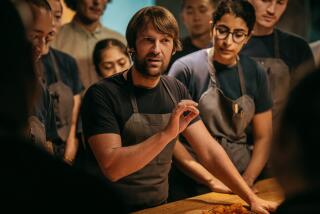Although vegetables may seduce mostly women, an Italian dish has aroused a masculine apostate
- Share via
My recent disclosure that I have never liked vegetables--especially spinach, broccoli, asparagus, artichoke and eggplant--has brought me both cheers and poisoned arrows.
Many readers doubted that my wife could have remained ignorant of this frailty for 47 years. They simply do not understand that I am rather a private person, not given to self-revelation.
Not surprisingly, more men applauded me than women. Is it possible that women have more of an affinity for vegetables than men? It seems to be true--at least in the Charlton Heston household.
“Your piece on vegetables struck a resonant chord,” he writes. “I don’t like them much either. I think we have a gender-defining syndrome here. Men tend to dislike vegetables, women tend to like them. My wife’s reaction to your column was succinct: ‘It’s stupid not to like vegetables!’ I myself confess to an accommodation of spinach and cucumbers, but we great humanitarians are noted for our tolerance.”
Seymour Holtzman of Arcadia writes that his household is similarly split: “For years I concealed this shortcoming of mine by waiting until my wife turned her head away at the table or got up to serve, and very quickly I would transfer the vegetables on my plate onto her plate. She loved vegetables so much that she never noticed. . . . “
I wonder if Holtzman doesn’t underestimate his wife. My guess is that she was playing along with his trick to get more than her share.
Joy Garcia of Sherman Oaks recalls that as a child she employed an even more desperate deceit to avoid eating string beans. “My mother served them very overcooked and consequently very gray. I had to stay at the dinner table until they were consumed. Many a lonely evening was spent in this manner. After a while I started putting them in my pockets. Then when released, I’d run outside and give them to the dog.”
Inevitably, she was caught. She forgot to empty her pockets and her mother found the string beans when she washed her jeans.
“I still hate string beans, Brussels sprouts and (the worst) eggplant.”
“I too loathe vegetables,” writes Bill Gordon of Fullerton. “Vegetable soup is palatable as long as it’s cooked to the point that the vegetables are tasteless and in small enough pieces to be swallowed whole.
“I am disappointed to know that you have wimped out all of these years and have actually eaten that disgusting stuff to please your wife.”
Several people have written to say that my wife evidently doesn’t know how to prepare artichokes, or I wouldn’t find them so disagreeable. I’m not about to question my wife’s cooking just to exonerate an inedible vegetable.
The other night she served artichokes again, but first cut off the swordlike tips that antagonize me so much. It was a good try, but it didn’t change the taste any.
I am also told that the hateful “choke,” the furry, spiny part that guards the heart from human access, may be easily removed with a knife.
“Those terrible little spears you mention,” writes William Robb of Orcutt, “make up the choke. It can be removed quite easily.”
Robb is an expert on vegetables, being an agriculture biologist with the Office of the Agricultural Commissioner in Santa Barbara. He says that those things I call leaves, with the sword points, are not leaves. “What you eat are the bracts . The spines you refer to are called thorns.”
I can’t say that replacing the word leaves with bracts and spines with thorns makes the artichoke any more palatable.
Ruth Brower also advises me on getting rid of the choke. “With a small, sharp knife and a skillful movement, all the little spears can be removed very easily, in one piece. And it’s fun to do it.”
Fun? How much do you want to bet I could do it without drawing blood?
Stan Leland agrees with me but warns against the “cunning” of the cook.
“Only last night I was served a delicious cream soup, which I relished, but which, I was informed after my second bowl, had as its basic ingredient, br----i. I can’t get myself to write the word, let alone eat the stuff.”
I’m afraid Leland’s belated reaction betrays a prejudice that I may well share. I think that’s why I keep trying.
Carl H. Wennerberg of Valley Center tells me there is good scientific evidence for eschewing spinach.
“Dr. Roger Truesdale, founder of the laboratories of the same name and a former professor of chemistry at Pomona College, did a very important study that demonstrated that spinach ties up the calcium in a person’s system.”
Inevitably I heard from vegetarians who believe it is inhumane to eat other animals, and that only through vegetarianism will the race become benign and loving.
This philosophy was expressed with his usual felicity by the great humanist Henry David Thoreau: “I have no doubt that it is part of the destiny of the human race, in its gradual improvement, to leave off eating animals, as surely as the savage tribes have left off eating each other when they come in contact with the more civilized.”
(By the way, it was those more civilized tribes that gave the Tahitians tuberculosis and syphilis.)
And George Bernard Shaw observed: “Ferocity is still characteristic of bulls and other vegetarians.”
On the other hand, we dined with friends at Spago’s the other night, and I had angel hair pasta with broccoli, goat cheese and thyme.
It was divine.
More to Read
Eat your way across L.A.
Get our weekly Tasting Notes newsletter for reviews, news and more.
You may occasionally receive promotional content from the Los Angeles Times.









